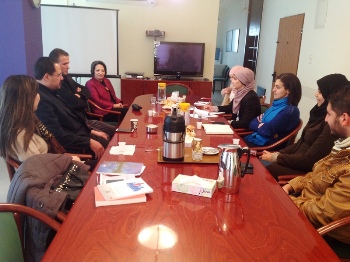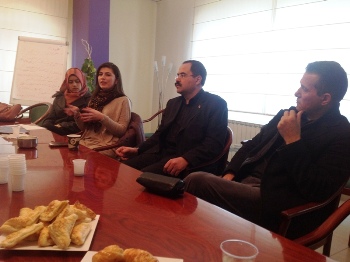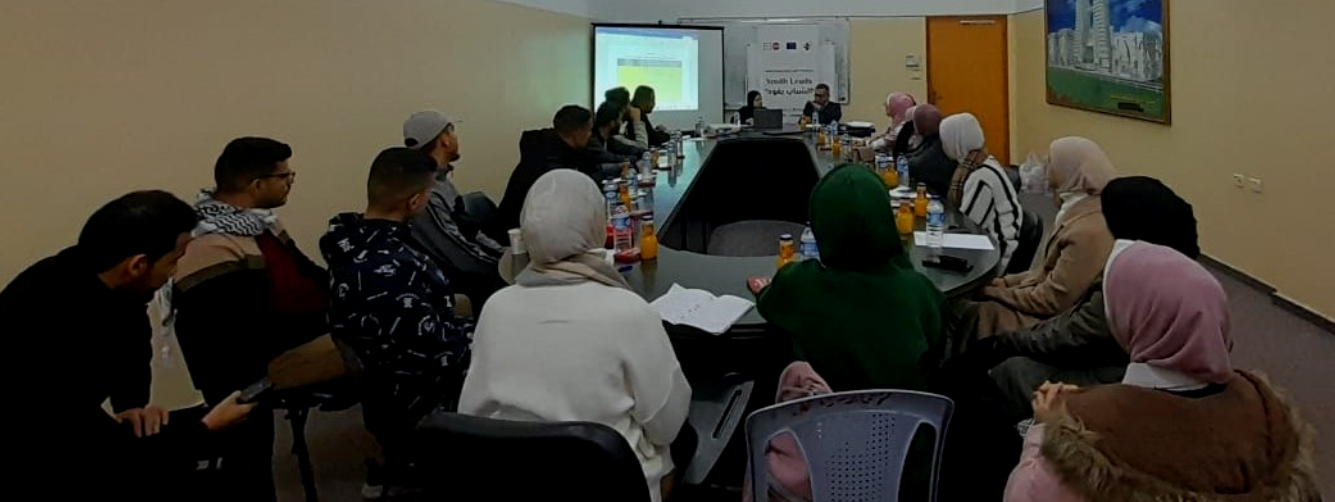
Ramallah – As part of MIFTAH’s “Participation Enhancement” program, four young women leaders recently presented their experiences during an assessment workshop on the ‘shadow opportunity’ intervention within AMAL project. The project paired them with leadership figures for one month as part of the “Supporting Women’s Transformative Leadership in Changing Times” Project [AMAL], a partnership between MIFTAH , OXFAM, the Palestinian Working Women’s Society, the Women’s Center for Legal and Social Counseling and the Women’s Affairs Center, with support from SIDA.
Dr. Feidy: A unique experience
MIFTAH CEO Dr. Lily Feidy stressed on the importance and uniqueness of the experience, noting that they planned to expand the project to include young male activists in the future as well. In this context, Dr. Feidy recommended that the activity becomes part of MIFTAH’s agenda, saying one month was not enough for such an experience. “This needs more time so the young women//men could fully benefit and learn from the leaders, particularly on the issue of elections and on how to become part of political parties,” she said.
Najwa Abu Nijem: getting inside the head of leaders
Activist Najwa Abu Najm accompanied PLC member Ala’ Yaghi. “This experience introduced the idea of getting into the head of leaders, so to speak,” she said. “This means delving into their thoughts, which could include long-term political prospects, predictions for the future and a different way of thinking than ordinary citizens.” Abu Nijem also said the experience was character-building and helped her deal with things up close. She added that she also found her own love for helping others and for giving back to the people. “I learned more about respecting people’s privacy and about being sensitive to their issues,” she said.
As for the secret to success in this regard, Abu Nijem maintained: “Stay away from factional intolerance and blind subordination to any faction, which only generates criticism and fault. “On the contrary, mistakes should be rectified and built on in order to develop and upgrade factions,” she said.
One thing she said was lacking was the fact that the PLC is not in session. “If they were working, perhaps the experience would have been even richer and I could have gotten an even closer look as to how Yaghi operates as a PLC member,” she said.
Hanin Ramadan: An important experience
Young Nablus activist Hanin Ramadan accompanied presidential information technology advisor Sabri Saydam, who she described as “complex”. She explains: “On the one hand, he is a decision-maker and on the other he is a leader. Then sometimes he is an economist. He is so many things at once,” she says. Ramadan said she learned ‘the value of time” with Saydam, who is extremely punctual. “He was able to merge his political character with his identity as a father through his positive relationship with his children,” she said.
Ramadan said the experience was “very important” and hoped it would continue and expand to also include young male activists, who she said would also benefit from the experience through seeing things “on the other side of the lives of political leaders.”
Lana Baker: Gaining information
Baker, a youth activist from Salfeet, accompanied Dr. Azmi Shuaibi, who she said was a bit ‘intimidating’. While she admitted that her experience was extremely beneficial, she says Shuaibi focused a lot on information and how to gain it. She maintained however, that he always had a human touch in his interactions with employees. Still, Baker said she would have preferred to accompany a female leader so she could have better delivered the voice of women to decision-makers.
Jumana Abu Hilal: Higher motivation
University student Jumana Abu Hilal from Jericho accompanied female leader Rima Nazzal, from whom she said she learned a lot. “She always motivated me and we would talk about so many things,” she said. “I would do this again if I had the chance,” Hilal maintained. “It gave me the opportunity to attend meetings and meet people in important decisions.”
Riziq Atawneh: Involve young men too…
Youth activist Riziq Atawneh from Beit Kahel in the Hebron district was at the meeting as well. After listening to the presentations from the youth activists, he added: “This project gives hope to youth that things are moving in the right direction. I hope young male activists will also be given the opportunity to have the same experience.”
PLC member Ala’ Yaghi concurred, saying it was a good idea to involve as many youths – both male and female – in such an important endeavor. As for the activist who accompanied him, Najwa Abu Nijem, Yaghi said: “She was amazing. She already had information but she asked many questions and learned a lot. It was an opportunity for her to see how we work on the ground.”
Yaghi also commended the pioneer project. “Youth should be able to assume their rightful role and have more independence,” he said. “They should have leadership committees that are separate from political factions.” He thanked MIFTAH for the activity, saying it was refreshing to see an organization sponsoring the youth generation.
A ray of hope
Meanwhile, Sabri Saydam called the project a ‘ray of hope’ for Palestine’s youth, offering the chance to get to know the workings of their political leaders. He recommended that young male activists accompany female leaders to become more acquainted with their experience in leadership.
Lamis Shuaibi: An opportunity to empower a leadership cadre
MIFTAH Program Director Lamis Shuaibi said the shadow opportunity program was a chance to empower a leadership cadre among youth and offer them leadership skills. “Young female activists were able to intern with decision makers and therefore bridge the gap between the youth and leadership,” she said. This, she maintained, created a supportive environment that enables decision makers and leaders to transfer expertise and knowledge in a practical and applied manner within an interactive framework for youth, far removed from conventional norms.
Zaghari: Boosting the capabilities of female youth activists
MIFTAH project coordinator Abeer Zaghari said this project seeks to boost the capabilities of young men and women, especially in marginalized areas, to allow them to participate in the leadership at all decision-making levels. “This would help to ensure that their needs/rights are achieved within the prevalent structure,” she explained.
Zaghari said the project was conducted over two phases. The first was focused on capacity -building through a series of trainings in citizenship, advocacy and democracy along with providing internships for some participants in partner organizations. The second phase focused on decision-makers through meetings with officials and the opportunity of accompanying leaders, which MIFTAH provided for several participants.








